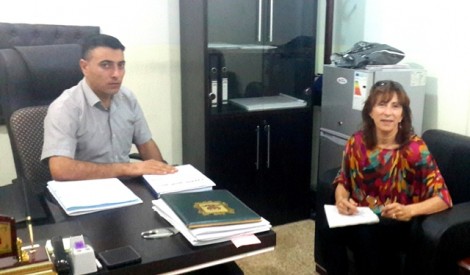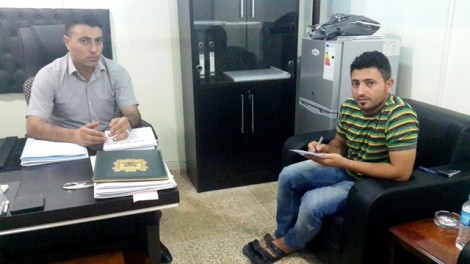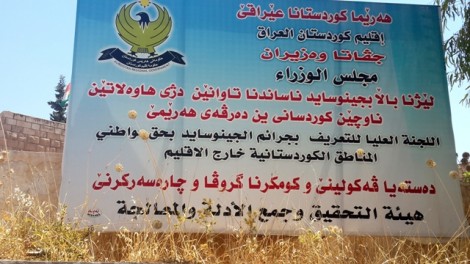The Genocide Office to Identify Crimes Against Kurdish People Outside of the Kurdistan Regional Government (KRG) was established in Duhok, Kurdistan, in September 2014, under the Kurdistan Ministry of Interior. It serves Kurds, Yezidis, Christians and other minorities who suffered at the hands of the Islamic State jihadists (also referred to as IS, ISIS, ISIL, ISHID, or Daesh).
On August 3, 2014, ISIS violently attacked Shengal, killing and kidnapping over 10,000 Yezidis in 48 hours, and sending approximately 400,000 Yezidis fleeing north to the peaceful and protected Kurdistan region. Shengal is a disputed territory between Baghdad and Kurdistan. Most of it has now been freed from ISIS but remains uninhabitable. Peshmerga defense forces from Kurdistan and YPG forces from Rojava, Syria, are defending Shengal.
The Genocide Office is open to the public without appointment or fees. It is located directly across the street from the hospital for pregnant women. The Genocide Office is headed by a judge and staffed with five police, a social worker, and a psychologist.
Those who have escaped from ISIS captivity are encouraged to report their kidnapping and captivity. A staff “psychological researcher” makes a preliminary evaluation. Those with critical physical or psychological symptoms are admitted to the hospital for immediate short-term treatment.
Persons may also report missing, kidnapped, or known dead family members. When they make their report, they are sent to the hospital to give blood samples. These blood samples are stored with the Ministry of Health for future DNA matching against dead bodies that have been recovered, or will be recovered, in the future when ISIS is defeated.
Many people have lost their IDs. A staff social worker assists them with applying for and getting replacement IDs and national Iraq citizenship certificates.
Documentation of persons killed, missing, or kidnapped at the hands of ISIS is also necessary for surviving family members to obtain government financial assistance.
The investigation unit of the Genocide Office is headed by police Captain Falah Hasan Jiyan with a staff of two male police officers and two female officers. Each person is interviewed by a police officer and a case file is created. Later, the judge reviews the documentation, meets with the person, signs, and completes the file in preparation for future prosecution of genocide and crimes against humanity within the country or by the International Criminal Court (ICC) with headquarters in The Hague.
The Genocide Office keeps a database of all names reported and can search it for persons searching for their missing family members. As of June 2015, the office has completed 200 case investigations, mostly for Yezidis. There is a waiting list of 2,000 people to interview. There is also a list of 500 missing or killed Yezidis. Although, over 10,000 Yezidis were killed or kidnapped by ISIS, the database kept by the Genocide Office does not share its data nor merge it with other databases.
Captain Falah Hasan Jiyan explains that the primary help that the office needs is transportation funds for internally displaced persons (IDPs) living in the camps to get to the office in Duhok. Many persons miss their appointments because they cannot afford the taxi ride from Zakho to Duhok. There is no public bus service.
The other need is for professional training for the entire staff in the proper investigation techniques and documentation requirements to prepare cases for future successful prosecution by an ICC Tribunal.
The Rwandan Genocide was a genocidal mass slaughter of Tutsi and moderate Hutu in Rwanda by members of the Hutu majority in 1994. During a 100-day period, an estimated 800,000 Rwandans were killed, constituting as much as 70% of the Tutsi and 20% of Rwanda’s total population. The ICC established the International Criminal Tribunal for Rwanda (ICTR) which had convicted 95 persons of genocidal acts as of December 2014. It is closing its work in 2015, twenty-one years after the genocide.
If the United Nations Security Council declares the attack on Yezidis in Shengal a genocide, the ICC can proceed with establishing a tribunal to prosecute genocide and crimes against humanity.
Dr. Amy L. Beam promotes tourism in eastern Turkey at Mount Ararat Trek and writes political and historical commentary on Kurds and Yezidis in Turkey and Kurdistan atKurdistan Tribune. She has been reporting on the Yezidis since September 2014. Twitter @amybeam; amybeam@yahoo.com.
.jpg)







Latest News from the White House:
President Barrack Obama will convene an urgent meeting with his senior cabinet members to discuss an international conference on the plight of 50 million Kurds in 4 states sponsored by United Nation. China, Russia, India would also be invited as independent observers. It would pave the way for all other minority groups in the Middle East.
Dr. Amy L. Beam:
Can a case be prepared against a dictator unwilling to step down?
What about a corrupt Government Official 5-10 years from now on? Any legal advice?
Is Masood Barzani waiting for all his old friends to step down? It starts with him first!